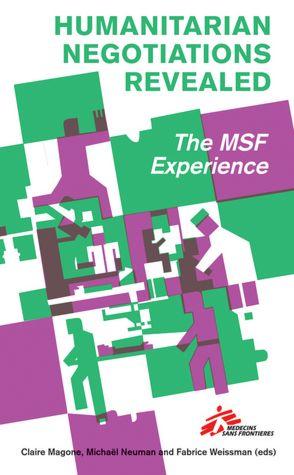 Humanitarian Negotiations Revealed: The MSF Experience, Claire Magone, Michaël Neuman, and Fabrice Weissman, eds. (London: Hurst & Company, 2011), 300 pp., £55 cloth, £16.99 paper.
Humanitarian Negotiations Revealed: The MSF Experience, Claire Magone, Michaël Neuman, and Fabrice Weissman, eds. (London: Hurst & Company, 2011), 300 pp., £55 cloth, £16.99 paper.
Humanitarian Reason: A Moral History of the Present, Didier Fassin (Berkeley, Calif.: University of California Press, 2011), 352 pp., $65 cloth, $26.95 paper.
These two recent works make a complementary and refreshing contribution to the burgeoning field of humanitarian studies. Both books shed new light on the authority that humanitarians wield as mediators of suffering, the relationship between humanitarianism and politics, and the nature of “humanitarian space.” The first, an edited volume of case studies and essays by practitioners from or closely linked to Médecins Sans Frontières (MSF), focuses on the negotiations and compromises humanitarians are forced to make in  their encounters with political interests on the ground. The second, by the sociologist and anthropologist Didier Fassin, sets out an account of humanitarianism as a mode of politics in and of itself.
their encounters with political interests on the ground. The second, by the sociologist and anthropologist Didier Fassin, sets out an account of humanitarianism as a mode of politics in and of itself.
For those navigating the ongoing debates on the crisis of humanitarian identity, MSF often appears to offer a comforting model of humanitarian purity, marked by a strong sense of independence, a willingness to withdraw from situations involving unacceptable compromise, and a commitment to bearing witness to atrocity through the practice of témoignage (testimony). Within MSF there is a culture of reflection and self-critique, which, crucially for those of us who prefer to stand at some distance from the firing line, it is often willing to make public and commit to paper.
Humanitarian Negotiations Revealed: The MSF Experience, edited by Claire Magone, Michaël Neuman, and Fabrice Weissman, lays bare the practical compromises that MSF, in spite of its reputation for uncompromising adhesion to its principles, is often forced to make on the ground. Specifically, the book examines the reasoning behind operational decisions made in twelve countries, including Afghanistan, Pakistan, Somalia, and Sri Lanka, and in doing so it both punctures the mythology surrounding MSF and brings out some of the broader tensions inherent in the politics of humanitarian action.
For MSF, humanitarian action needs to be precisely, possibly even narrowly, defined if it is not to be instrumentalized as a cover for political objectives. MSF grounds its authority to act in its technical knowledge and medical expertise, and seeks to insure itself against the danger of that expertise being co-opted by other political actors through its emphasis on témoignage and its willingness to withdraw if conditions become unacceptable. However, as becomes clear from the book’s case studies and a chapter by Weissman on MSF’s history of speaking out, the organization has often bitten its tongue in exchange for access. But the question frequently arises: access to what? As these case studies reveal, it is rare that one set-piece negotiation yields full access to the key area of suffering that MSF is targeting for action. Rather, a picture emerges of constant negotiation and frequent compromise as well as a need for a continuous evaluation of whether compromise has been taken too far.
The high price MSF sometimes pays for moderate or incremental gains underscores the nature of the dilemma that humanitarians often face: whether to sacrifice their principles or the lives of the potential beneficiaries of their aid. Moreover, it is often not a one-off choice, but rather a permanent balancing act in which humanitarianism’s sense of self and the lives of others are frequently on opposite sides of the scales. And if humanitarianism always involves political negotiation, there is also a deeper sense in which it represents a kind of politics. As Jonathan Whittall argues in his analysis of MSF’s work in Pakistan:
MSF’s ability to increase its safe operating environment, at least in the eyes of the armed opposition, is less about how its principles are understood and more about how its politics are perceived. The affirmation of “neutrality and independence” that MSF lobbies for so vigorously in Pakistan is so against the practices of state-led humanitarianism at the service of counter-insurgency and stabilization that it becomes a political position in itself that can lead to a degree of acceptance (p. 74).
While it is now conventional to point out that humanitarianism has political consequences, it is rarer for humanitarians to acknowledge that their aspirations and principles constitute a distinctive form of politics. This revealing passage suggests that embracing the fact that such key operating principles as neutrality and independence represent a particular vision of politics may be more effective than pretending that the core principles of humanitarian action have a universal degree of acceptance and a position beyond the political.
The political nature of MSF’s work relates to another of the book’s themes, the problematizing of the notion of “humanitarian space”—a concept often attributed to Rony Brauman, a former president or MSF-France. In her contribution to the volume, Marie-Pierre Allié, one of Brauman's successors, comes close to abandoning the possibility of an apolitical humanitarian space altogether. Instead, she writes of a “space for negotiation, power games and interest-seeking between aid actors and authorities” (pp. 2–3), and points to the need for “political autonomy” for humanitarian organizations (p. 9). This shift is welcomed by David Rieff, who, in a characteristically pithy afterword, summarizes his objections to what he sees as the dangerous illusions of humanitarian rhetoric. Writes Rieff:
The relevance of the idea of autonomy derives from its essentially transactional nature—at least when applied to the humanitarian context. One does not simply assert one’s autonomy, one defends it. In contrast, humanitarian space is a sentimental idea, neutrality a bogus one, and impartiality an abstraction, however necessary, and it is a lost cause to try to defend any of them. The sooner they are given a decent burial, the sooner we can all move on (pp. 253–54).
What, then, are we left with? Perhaps MSF’s vision of politics is best summarized as a refusal to tolerate suffering. The organization’s claim to political autonomy ultimately rests on a technical—medical—engagement with that suffering. So the issue at the heart of humanitarian politics is how suffering is conceptualized, and whose suffering is accorded value.
This problem is the subject of Didier Fassin’s Humanitarian Reason: A Moral History of the Present, which examines the role of “humanitarian reason” in the “politics of precarious lives” (p. 5) in order to reveal the multiple forms of “humanitarian government” at the heart of our contemporary political orders. The volume updates and reworks a number of important articles Fassin has published over the last decade, and it provides a fascinating theoretical discussion of some of the tensions illustrated by the MSF book. But more important, it engages in a wider reflection on the place of technical knowledge in relation to suffering, and draws out the problematic power dynamics inherent in all humanitarian action. Fassin deliberately offers little in the way of normative prescription, but his work has serious implications for the study of humanitarianism within international ethics.
Fassin’s starting point is noteworthy in itself. In recent decades, humanitarianism has generally been seen as a purely international concept. Fassin, in contrast, draws on both domestic and international case studies, implying a broader definition of the term. He focuses on those living the most exposed, precarious lives, whether at home or abroad, before turning to the ways in which succor is conceptualized and then offered, whether by a domestic or international actor. The domestic cases Fassin uses are all French—and it is interesting to note that MSF itself maintains a small number of programs in France—but equivalent cases could easily be found in most wealthy countries.
By juxtaposing the ways in which we treat the suffering of distant others with what we do when they turn up at our door, Fassin is able to show that the role of “humanitarian reason” in contemporary politics is both more extensive and more problematic than is generally thought. Humanitarian Reason often addresses the extent to which the vulnerable are subject to the arbitrary or contingent decisions of officials and/or experts over whether and how to help them. Fassin demonstrates that, more often than not, humanitarians sit in judgment over the suffering of others.
Fassin investigates the conditions and framings that make certain decisions more or less likely in situations where these judgments take place. For him, humanitarian reason functions as a powerful “social imaginary,” in Charles Taylor’s useful phrase, which elucidates and enables particular social practices (p. 247). He demonstrates how, with the ascent of humanitarian sentiments as a political vocabulary, two forms of humanitarian government have emerged: “In poor countries it deals with large and often undifferentiated populations, for whom mass initiatives are set in place. In rich countries, it is faced with individuals, whose narratives it examines and whose bodies it scrutinizes” (p. 253). Within the former context, Fassin sees refugees as the emblematic category; within the latter, asylum seekers. These subjects of humanitarian government often dwell within political spaces, such as refugee camps, within which humanitarians are powerful political actors.
Fassin shows how in asserting its political autonomy, humanitarianism inevitably creates hierarchies of humanity: between the deserving and undeserving poor, between the right and wrong kinds of immigrants, between victims and perpetrators. As he puts it, “Humanitarianism, independently of the goodwill of the rescuers, constructs an unequal relationship between the one giving aid and the one being aided” (p. 193). For example, Fassin documents the ways in which medical assessments of physical scars, which are often accorded more weight than firsthand testimony of political persecution, have become key pieces of evidence of suffering in many French asylum cases. Moreover, this is a quandary that humanitarianism cannot necessarily escape: looking for truth about suffering in its physical legacy carries the risk of depoliticizing that suffering and reducing a person to a body, while speaking out on behalf of the victim risks co-opting and distorting that voice.
Ultimately, neither book provides any easy answers to the dilemmas that beset humanitarianism, but they do add important nuance to the debate. The MSF volume conveys just how much of a struggle it is to identify, access, and bring even a modicum of relief to those in need; but it also reminds us of the importance of trying to do so. Fassin’s account challenges us not to pigeonhole humanitarianism as something that only happens in faraway places, but to consider it as a powerful political vocabulary that has much broader resonance in our everyday lives.
Henry Radice is Research Manager, Justice and Security Research Programme, in the Department of International Development at the London School of Economics and Political Science.
More in this issue

Winter 2012 (26.4) • Review
Global Civics: Responsibilities and Rights in an Interdependent World Edited by Hakan Altinay
"Global Civics" is an attempt to ignite a dialogue about responsibilities and rights in an increasingly interdependent world, and should be of interest to anyone ...

Winter 2012 (26.4) • Review
Dignity in Adversity: Human Rights in Troubled Times by Seyla Benhabib
In this book, Benhabib makes a compelling case for a “cosmopolitanism without illusions” that may help show the way through an uncertain world transformed and ...
Winter 2012 (26.4) • Feature
Climate Justice and Capabilities: A Framework for Adaptation Policy
This article argues that most well-known approaches to climate justice have two important weaknesses, in that they fail to take advantage of two crucial developments: ...